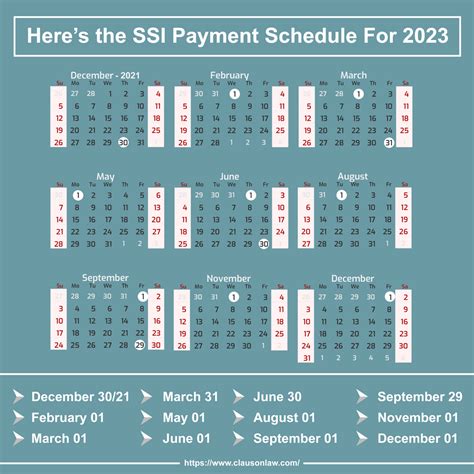
SSI recipients will receive their June Supplemental Security Income (SSI) payment early, on May 31st, due to the June 1st date falling on a Saturday. The Social Security Administration (SSA) has also released the 2025 payment schedule for SSI benefits.
Early SSI Payments Arrive in May, 2025 Schedule Unveiled
Millions of Americans who rely on Supplemental Security Income (SSI) will receive their June payments earlier than usual, landing in bank accounts on Friday, May 31, 2024. This early disbursement stems from the standard SSI payment date of June 1st falling on a Saturday. According to the Social Security Administration (SSA) guidelines, when the 1st of the month falls on a weekend or holiday, the payment is issued on the preceding business day. This adjustment ensures that beneficiaries receive their funds without interruption. Concurrently, the SSA has released the comprehensive payment schedule for SSI benefits throughout 2025, allowing recipients to plan their finances well in advance.
Understanding the Early Payment Mechanism
The Social Security Administration operates under a strict schedule for disbursing SSI payments, ensuring timely delivery of vital financial support to eligible individuals. SSI provides crucial assistance to adults and children with disabilities who have limited income and resources, as well as to individuals aged 65 and older who meet specific financial criteria. These payments are designed to cover basic needs such as housing, food, and clothing, providing a safety net for vulnerable populations.
The reason for the early payment is a direct consequence of the SSA’s established protocol. When the typical payment date, which is the first day of the month, coincides with a weekend (Saturday or Sunday) or a federal holiday, the payment is expedited to the immediately preceding business day. This protocol is in place to prevent any delays in the receipt of funds, recognizing that many beneficiaries rely on these payments to meet their immediate financial obligations.
“For SSI benefits, if the first of the month falls on a weekend or holiday, the payment is made on the prior business day,” the SSA confirms on its official website. This straightforward rule is crucial for managing expectations among recipients and avoiding any potential financial hardship that a delayed payment could cause.
The Significance of the 2025 Payment Schedule
Beyond the immediate adjustment for the June 2024 payment, the release of the 2025 payment schedule is a significant event for SSI recipients. This schedule provides a clear roadmap of when payments can be expected throughout the upcoming year, enabling individuals and families to plan their budgets effectively.
The SSA publishes this schedule well in advance to foster financial stability and reduce uncertainty among beneficiaries. With a predictable payment calendar, recipients can coordinate their expenses, manage their bills, and make informed decisions about their financial future. This proactive approach contributes to greater peace of mind and enhanced financial well-being for those who depend on SSI.
The 2025 schedule will outline all monthly payment dates, taking into account any potential adjustments due to weekends or holidays. Recipients are encouraged to consult this schedule, which is typically available on the SSA’s website, to stay informed about their payment timelines.
Who is Eligible for SSI?
Supplemental Security Income (SSI) is a needs-based program funded by general tax revenues, not Social Security taxes. It is designed to provide financial assistance to individuals who meet specific eligibility requirements, regardless of their work history.
The primary eligibility criteria for SSI are as follows:
- Age or Disability: Individuals must be aged 65 or older, blind, or have a disability. Children under the age of 18 can also be eligible for SSI if they have a disability that meets the SSA’s criteria.
- Limited Income and Resources: Applicants must have limited income and resources. The SSA sets specific income and resource limits, which are updated annually. Resources include assets such as bank accounts, stocks, and bonds. Certain assets, such as a primary residence and a vehicle, may be excluded from consideration.
- U.S. Residency: Applicants must be residents of the United States, including the 50 states, the District of Columbia, and the Northern Mariana Islands. Certain non-citizens may also be eligible for SSI if they meet specific immigration requirements.
The SSA evaluates each applicant’s circumstances on a case-by-case basis to determine eligibility. The application process involves providing detailed information about income, resources, living arrangements, and medical conditions.
How to Apply for SSI
Applying for SSI can be done in several ways:
- Online: Individuals can start the application process online through the Social Security Administration’s website (www.ssa.gov). This is often the most convenient option for those who have access to a computer and the internet.
- By Phone: Applicants can call the SSA’s toll-free number (1-800-772-1213) to apply over the phone. This option is suitable for those who prefer to speak directly with a representative.
- In Person: Individuals can visit their local Social Security office to apply in person. This is a good option for those who need assistance with the application process or have specific questions.
During the application process, applicants will need to provide documentation to support their claims, such as proof of age, citizenship or immigration status, income, resources, and medical records (if applicable).
The SSA will review the application and make a determination based on the information provided. If approved, the applicant will begin receiving SSI payments, typically starting the month after the determination is made.
The Impact of SSI on Beneficiaries’ Lives
SSI plays a critical role in alleviating poverty and promoting independence among vulnerable populations. The program provides a stable source of income that helps beneficiaries meet their basic needs and maintain a decent standard of living.
For individuals with disabilities, SSI can be particularly important in covering the costs of medical care, assistive devices, and other specialized services. The program can also enable beneficiaries to live independently and participate more fully in their communities.
For older adults with limited income, SSI can provide a financial lifeline that helps them afford housing, food, and other essential expenses. The program can also help to reduce the risk of homelessness and improve overall quality of life.
Potential Challenges and Considerations
While SSI is a vital safety net, there are also potential challenges and considerations that beneficiaries should be aware of.
One common challenge is navigating the program’s complex rules and regulations. The SSA’s eligibility requirements, income limits, and resource limits can be difficult to understand, and beneficiaries may need assistance in managing their benefits and complying with program rules.
Another consideration is the potential impact of SSI on other benefits. Receiving SSI can affect eligibility for other government programs, such as Medicaid and food stamps (SNAP). Beneficiaries should be aware of these potential interactions and seek guidance from qualified professionals if needed.
Future of SSI
The future of SSI depends on a variety of factors, including economic conditions, demographic trends, and policy decisions. As the population ages and the number of individuals with disabilities increases, the demand for SSI benefits is likely to grow.
Policymakers will need to address the challenges of funding and administering the program in a sustainable manner while ensuring that it continues to provide adequate support to those who need it most. Potential reforms could include adjusting eligibility requirements, increasing benefit levels, and improving program administration.
Importance of Staying Informed
It is essential for SSI recipients and prospective applicants to stay informed about program rules, payment schedules, and any potential changes that may affect their benefits. The Social Security Administration’s website (www.ssa.gov) is a valuable resource for accessing up-to-date information and guidance.
Additionally, beneficiaries can consult with Social Security representatives, legal aid organizations, and other qualified professionals to get assistance with their specific needs and circumstances. Staying informed and seeking expert advice can help SSI recipients maximize their benefits and ensure their long-term financial security.
Expert Commentary
Financial experts emphasize the importance of understanding the nuances of SSI payments and planning accordingly. “Knowing when your SSI payment will arrive is crucial for budgeting and managing your finances,” says certified financial planner Sarah Johnson. “The early payment in May is a good example of why it’s important to stay informed about the SSA’s schedule.”
Johnson also advises SSI recipients to take advantage of resources available to them, such as financial counseling services and budgeting tools. “There are many organizations that offer free or low-cost financial assistance to SSI beneficiaries,” she notes. “These resources can help individuals make the most of their limited income and achieve their financial goals.”
The Role of Advocacy Groups
Advocacy groups play a vital role in protecting the rights and interests of SSI recipients. These organizations work to raise awareness about the program, advocate for policy changes, and provide direct assistance to beneficiaries.
The National Association of Social Security Claimants’ Representatives (NOSSCR) is one such organization that advocates for the rights of individuals seeking Social Security and SSI benefits. NOSSCR provides training and resources to attorneys and advocates who represent claimants, and it also works to influence policy decisions that affect the program.
Other advocacy groups, such as the Disability Rights Education & Defense Fund (DREDF) and the National Council on Aging (NCOA), also work to promote the rights and well-being of SSI recipients. These organizations provide a voice for vulnerable populations and help to ensure that their needs are met.
Conclusion
The early disbursement of June SSI payments in May provides a timely reminder of the importance of understanding and planning for these benefits. The release of the 2025 payment schedule further underscores the Social Security Administration’s commitment to providing predictable and reliable support to eligible individuals.
By staying informed, seeking expert advice, and advocating for their rights, SSI recipients can maximize the benefits of this vital program and achieve greater financial security and independence. The program serves as a critical lifeline for millions of Americans, and its continued success depends on the collective efforts of policymakers, advocacy groups, and individual beneficiaries.
Frequently Asked Questions (FAQs)
-
Why am I receiving my June SSI payment in May?
You are receiving your June SSI payment early because June 1st, 2024, falls on a Saturday. According to the Social Security Administration (SSA) guidelines, when the 1st of the month falls on a weekend or holiday, the payment is issued on the preceding business day.
-
When will I receive my SSI payment in July 2024?
You will receive your July SSI payment on the regularly scheduled date, which is July 1st, 2024, as it does not fall on a weekend or holiday.
-
Where can I find the 2025 SSI payment schedule?
The 2025 SSI payment schedule will be available on the Social Security Administration’s official website (www.ssa.gov). You can also contact your local Social Security office for a copy of the schedule.
-
What should I do if I don’t receive my SSI payment on the expected date?
If you do not receive your SSI payment on the expected date, you should first contact your bank or financial institution to confirm that the payment has not been deposited. If the payment has not been deposited, you should contact the Social Security Administration at 1-800-772-1213 to report the issue.
-
How does SSI eligibility differ from Social Security retirement benefits?
SSI (Supplemental Security Income) is a needs-based program based on limited income and resources, available to aged, blind, or disabled individuals. It’s funded by general tax revenues. Social Security retirement benefits, on the other hand, are based on your work history and contributions to Social Security through payroll taxes. Eligibility for retirement benefits depends on earning enough work credits over your lifetime.
- What are the income limits for SSI eligibility in 2024?
The income limits for SSI eligibility in 2024 are subject to change annually. In general, the SSA considers both earned income (from work) and unearned income (from other sources like pensions or investments). As a general guideline, the monthly income limit is typically around \$943 per month for an individual in 2024, but this can vary based on specific circumstances and deductions. It’s important to contact the SSA directly or consult their official website for the most accurate and up-to-date information.
- What are the resource limits for SSI eligibility in 2024?
The resource limits for SSI eligibility in 2024 are also subject to change. Resources include things you own, like bank accounts, stocks, and bonds. As a general guideline, the resource limit is \$2,000 for an individual and \$3,000 for a couple. Certain resources, like your home and one vehicle, are usually excluded. To get exact numbers and learn which resources are counted, consult the Social Security Administration.
-
How does getting married affect my SSI benefits?
Getting married can affect your SSI benefits because the SSA considers the income and resources of both spouses when determining eligibility and payment amount. If your spouse has income or resources that exceed the SSI limits, your benefits may be reduced or terminated. It’s important to report any changes in marital status to the SSA as soon as possible.
-
Can I work and still receive SSI benefits?
Yes, you can work and still receive SSI benefits, but your earnings may affect your payment amount. The SSA has specific rules about how earned income is treated when calculating SSI benefits. In general, the SSA excludes a certain amount of earned income and then reduces your SSI payment by a portion of the remaining amount. This is intended to encourage beneficiaries to work and become more self-sufficient.
-
What is a Representative Payee, and when is one needed for SSI recipients?
A Representative Payee is an individual or organization appointed by the Social Security Administration to manage the SSI benefits of someone who is unable to manage their own finances. This is typically needed for children, individuals with disabilities, or those deemed incapable of handling their funds responsibly. The Representative Payee is responsible for using the benefits to pay for the recipient’s essential needs, such as housing, food, and medical care, and must account for how the money is spent.
-
What happens if I move while receiving SSI benefits?
Moving can impact your SSI benefits, as it can affect your living arrangements and, consequently, your eligibility and payment amount. You must report any change of address to the Social Security Administration immediately. Depending on your new living arrangement (e.g., living alone, with family, in a nursing home), your benefit calculation might change. Failure to report a change of address can lead to overpayments, which you’ll be required to repay.
- How does the Social Security Administration determine if I am “disabled” for SSI eligibility?
The Social Security Administration (SSA) uses a strict definition of “disability” for SSI eligibility. Generally, you must have a medically determinable physical or mental impairment that prevents you from engaging in any substantial gainful activity (SGA). This means your condition must severely limit your ability to do basic work-related activities, like walking, sitting, lifting, remembering instructions, or interacting with others. The disability must have lasted, or be expected to last, for at least 12 months or result in death. The SSA will review your medical records, and may require you to undergo additional medical examinations, to determine if you meet their disability criteria.
- Are there any special SSI rules for students?
Yes, there are special rules for students receiving SSI. One significant rule is the Student Earned Income Exclusion (SEIE). This allows students under the age of 22 who are regularly attending school to exclude a certain amount of their earned income each month when the SSA calculates their SSI benefits. As of 2024, this exclusion allows a student to exclude up to \$2,290 of earnings per month, with a yearly maximum of \$9,230. This exclusion can significantly help students retain their SSI benefits while working part-time to support their education.
- What is a Continuing Disability Review (CDR), and how does it affect my SSI benefits?
A Continuing Disability Review (CDR) is a periodic review conducted by the Social Security Administration (SSA) to determine if an SSI recipient is still disabled. The SSA will review your medical records and may require you to undergo additional medical examinations to assess your current condition and ability to work. The frequency of CDRs varies depending on the severity and stability of your condition. If the SSA determines that your disability has improved to the point where you can engage in substantial gainful activity (SGA), your SSI benefits may be terminated. It’s important to cooperate with the CDR process and provide all requested information to ensure an accurate assessment of your disability.
- Can I appeal a decision made by the Social Security Administration regarding my SSI benefits?
Yes, you have the right to appeal a decision made by the Social Security Administration (SSA) regarding your SSI benefits. If you disagree with a decision, such as a denial of benefits or a termination of benefits, you can file an appeal within a specific timeframe (usually 60 days from the date of the notice). The appeals process typically involves several levels, including reconsideration, a hearing before an Administrative Law Judge (ALJ), a review by the Appeals Council, and ultimately, a federal court review. It’s often helpful to seek legal representation from an attorney or advocate experienced in Social Security law to navigate the appeals process effectively.
- What types of expenses can I pay for with my SSI benefits?
SSI benefits are intended to cover your basic needs, such as:
- Housing: Rent, mortgage payments, property taxes, homeowners insurance
- Food: Groceries, meals
- Clothing: Essential clothing items
- Medical Care: Doctor visits, prescriptions, medical insurance premiums
- Personal Care Items: Hygiene products, toiletries
- Utilities: Electricity, gas, water, heating oil, internet
- Other Essential Expenses: Transportation, phone service
While there are no strict rules on how you must spend your SSI benefits, they are generally expected to be used for these essential needs. As mentioned earlier, if you have a Representative Payee, they will manage your benefits and ensure that they are used appropriately.
- If I receive an inheritance, how will it affect my SSI benefits?
Receiving an inheritance can significantly affect your SSI benefits because it can increase your resources above the allowable limit. If the inheritance causes your resources to exceed \$2,000 (for an individual) or \$3,000 (for a couple), you may become ineligible for SSI. You are required to report any inheritance to the Social Security Administration as soon as possible. There are some strategies that may help mitigate the impact of an inheritance, such as placing the funds in a special needs trust or using them to purchase an exempt asset (e.g., a home). It’s best to consult with an attorney or financial advisor to explore your options.
- What is a Plan to Achieve Self-Support (PASS), and how can it help me maintain SSI benefits while pursuing a work goal?
A Plan to Achieve Self-Support (PASS) is a written plan approved by the Social Security Administration (SSA) that allows you to set aside income and/or resources to achieve a specific work goal. This goal could include starting a business, attending school or vocational training, or purchasing equipment or supplies needed for employment. If the SSA approves your PASS, the income and resources you set aside will not be counted when determining your SSI eligibility or payment amount. This can allow you to maintain your SSI benefits while you work towards self-sufficiency. You must follow the plan diligently and report your progress to the SSA regularly.
- Are there any resources available to help me manage my SSI benefits and finances?
Yes, there are several resources available to help you manage your SSI benefits and finances:
- Social Security Administration (SSA): The SSA website (www.ssa.gov) provides a wealth of information about SSI rules, payment schedules, and other important topics. You can also contact the SSA by phone or in person to get assistance with your specific questions or concerns.
- Area Agencies on Aging (AAAs): AAAs provide a range of services and supports for older adults, including financial assistance, counseling, and referrals to other resources.
- Centers for Independent Living (CILs): CILs provide services and supports for people with disabilities, including financial literacy training, benefits counseling, and advocacy.
- Nonprofit Organizations: Many nonprofit organizations offer free or low-cost financial counseling and assistance to SSI recipients.
It’s important to take advantage of these resources to ensure that you are managing your SSI benefits effectively and making informed financial decisions.
- How can I avoid SSI fraud and protect my personal information?
To avoid SSI fraud and protect your personal information:
- Be wary of unsolicited calls or emails: The Social Security Administration will never ask for your personal information, such as your Social Security number or bank account details, over the phone or by email.
- Protect your Social Security card: Keep your Social Security card in a safe place and avoid carrying it with you unless necessary.
- Be cautious about sharing your personal information online: Only provide your Social Security number or other sensitive information on secure websites that use encryption.
- Report suspected fraud to the Social Security Administration: If you suspect that someone is trying to commit fraud using your Social Security number or SSI benefits, contact the SSA immediately.
- Shred documents containing personal information: Before discarding any documents that contain your Social Security number, bank account information, or other sensitive details, shred them thoroughly to prevent identity theft.
- If I’m incarcerated, how does that impact my SSI Benefits?
If you’re incarcerated for more than a month, your SSI benefits will likely be suspended. The Social Security Administration (SSA) suspends SSI payments to individuals who are confined in a public institution, such as a prison or jail, for the entire month. Benefits may be reinstated the month following your release, provided you still meet all other eligibility requirements. It’s essential to notify the SSA immediately if you are incarcerated to avoid overpayments that you would be required to repay. Upon release, you’ll need to contact the SSA again to have your benefits reviewed for reinstatement.









